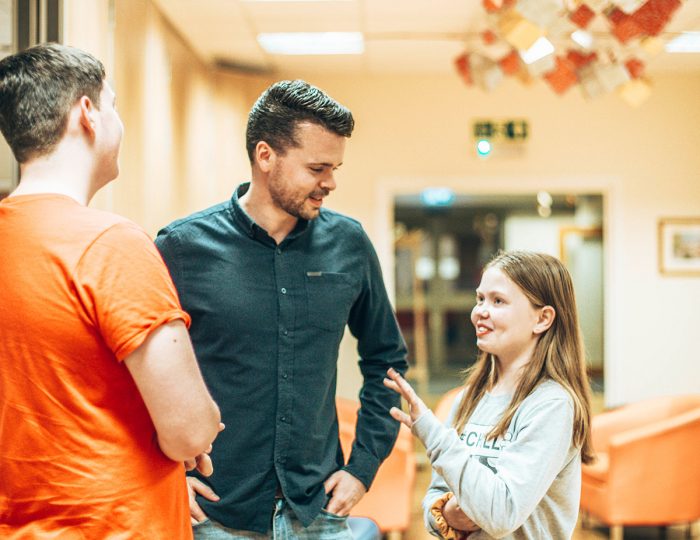Frontline Sundays
Frontline Sundays...
Read

People at different ages and stages of life, people in different kinds of work and family contexts will have their own set of unique challenges and opportunities. When it comes to discipling them, a ‘one size fits all’ approach won’t do. Everyone’s life is different, and each individual life passes through different seasons. Where do we even start?
Joe Warton learnt a bit about this during his time as Discipleship Pastor at Godmanchester Baptist Church (GBC).
This might make you jealous. Thinking about it, it makes me jealous. Between March 2016 and March 2018, I got to work part-time in my home church, and was not responsible for a single rota! The church received a grant to employ me on a part-time basis to focus on developing whole-life disciplemaking… and I liked it.
My work as an LICC researcher before and during the role meant I was interviewing swathes of church leaders making progress in this area, plus I was learning a thing or two from my LICC colleagues. The number of ideas I brought to GBC made it look like I was really creative, but essentially, I was just a thief. Shhhh.
Here are some of the lessons learnt, things done, and examples of fruitfulness unearthed during that time.
Big lesson number one: we are whole-life disciples for the whole of our lives. From the babygrow to the bungalow, each age and stage of the disciple brings with it a unique combination of challenges, opportunities for growth, and opportunities for mission. A Year 8 student, a new parent, a 52-year-old accountant, and an 84-year-old retiree all have the same goal: to become like Christ and serve him in the world. Yet their bodies, relationships, experiences, hearts, finances, and so forth are never static.
Big lesson number two: appropriate teaching, support, and prayer for each age and stage are built on asking the right questions, then listening to what people say. Everything I did involved a lot of learning from the experiences of the very people I was wanting to help grow. Each person is an expert in their own life. Once we had a greater appreciation of the congregants’ lived reality, we could tailor sermon series, training, events, and so forth around what we discovered. If your talk on the rest Jesus brings starts with ‘50% of you sitting here today said you’ve been struggling with tiredness and fatigue over the past year’, you’ve got their attention.
One great way to listen is through conducting a survey. Alongside Beca Hamilton, who was interning at the time, we designed an online survey and invited everyone in the church to complete it. It contained questions about their own growth, their engagement within church community, and their day-to-day lives beyond church activities. Once completed, we were able to break down the results according to age categories.
Much of what we discovered wasn’t revelatory, like how older people are more likely to set aside specific time to pray and read the Bible than the young. But there were lots of surprises. Only 13% of over-60s reported struggling with loneliness in the last 12 months, compared to a whopping 50% of those in their 20s. Retirement doesn’t reduce stress as much as I thought it would or should. While the over-60s reported less stress than the church average, over a third of them were finding it an issue. And despite the difference between the lives of secondary school students and those who qualify for insurance with Saga, both groups said the main objection their non-Christian peers have to Christianity is the fact that God allows evil and suffering.
Another listening exercise, dubbed ‘Beyond the Walls’, involved me visiting people at their homes or frontlines; having a conversation about what they do, how they see God at work, what they love about life, what’s hard and so on; then filming them talk about their life/frontline in response to some questions. We then shared these on the church website and Facebook page. Now people know what it was like for Reuben as an architectural intern before he headed to uni, how Paul & Julia are growing together as disciples in their marriage, and how David, a retired Baptist minister, seeks to bless his fellow tennis enthusiasts at the local tennis club.
Once a quarter, we held a ‘Sectors Service’. In these, we focused on a sector of industry (e.g. finance, charities, healthcare) or a stage of life (e.g. retirement, parenting/grandparenting, long-term illness), kicking off with a brief talk offering a biblical perspective on this sector or life stage. We then had a two or three-person panel from within those sectors answer pre-prepared questions. Questions covered things like what they did, what they enjoy, why they see it as significant to God, how their faith makes a difference, how God grows them there, and what it means for them to partner with God in his mission.
Ruth, grandparent of two, was one such panel member. ‘The opportunity to reflect on my role as a grandparent, and how my faith informs that, encouraged me to think about it in a way I hadn’t consciously done before… I have always been thankful for the opportunity to be so involved in my grandchildren’s lives and for the joy that involvement brings – but the invitation to talk about that in a church setting and to identify how my faith contributes positively to that relationship was really helpful’. The conversations with others in the church that followed were ‘extremely positive and encouraging’.
One young person recognised he could reflect the character of Christ by how he responded to bullies.
Of course, it wasn’t just helpful for Ruth. It helped the whole church get to know Ruth better, be encouraged by her example, and be more aware of how we can affirm and support her in that role. And it was helpful for other grandparents, enabling them to see how God is already working through them, and how they could grow in their awareness of God’s presence as they pick up the little ones from school, or play that ninth game of ‘Guess Who?’.
Throughout my time in that role and beyond, two words I found incredibly helpful are ‘challenges’ and ‘opportunities’.
Jeremiah thought he was too young; Abram & Sarai, too old; Isaiah, too sinful; the Jewish nation, too few. Every age and stage has its challenges, and Christians sometimes think these limit their potential for growth and involvement in what God’s doing. Those of us involved in leading, teaching, and pastoring need to acknowledge these challenges – they are real! Ignore them and people feel misunderstood, and we’re less likely to make progress together.
Sleep-deprived parents of young children are more likely to struggle with anger, connecting with God, and finding time to do things they need to do. Older workers in your congregation might be itching to retire, or dreading the thought. They might be weighed down with worries about their increasingly frail parents, or be worried about how they will cope with their own health problems. Both these groups have unique challenges, and both have unique opportunities.
Those young parents can learn to connect with God in new ways, learn to communicate more graciously with their spouse, and connect with other parents in the local area. Those older workers might have opportunities to pass on their wisdom to the next generation, use the respect they’ve earned to speak difficult truths, and they can learn to rely on God’s strength.
Two of the best moments of my time were spent exploring challenges and opportunities with groups at either end of the age spectrum. With a group of 11-to-14-year-olds, one young person recognised he could reflect the character of Christ by how he responded to bullies, another how she could include those who get left out, while others shared how they have been able to talk about their faith in RE lessons. In the retired ladies’ group, Anette shared how she’s now outside the front of her house more, vacuuming and washing the car. This has deepened her relationships with neighbours as they stop to chat when passing by, or decide to pop out and see Anette when they hear the ‘vrrrr’ of the Vax.
It was a privilege having so much time to focus on whole-life disciplemaking, and I know any future church roles will bring me face-to-face with at least one hair-greying rota! But even now, as a church member, having this awareness of stage-related challenges and opportunities informs my preaching to, praying for, and conversing with my brothers and sisters in Christ.

Some things to try
Have conversations
Have conversations with a range of people in your church about their stage of life, exploring their particular challenges and opportunities.
Invite sharing from the front
Give those in different ages and stages an opportunity to talk about their frontlines, through This Time Tomorrow slots or filmed-on-location frontline interviews.
Hold a ‘sector service’
Identify two or three people from a sector/age/stage and invite them to share. Ask (with preparation beforehand!) what they do, what they like about it, what they find difficult, how they think God might be working through them, and what they would like prayer for. Then, pray for all those in the church in that sector.

Some things to look at
Transforming Work
A group resource aimed at workers, helping them to discover the value of their work, and be better equipped to follow Jesus that context.
Launched and Routed
These are video and discussion-based courses for students. Launched gives freshers a vision for uni life with God. Routed is for university students preparing to move into the workplace.
Fruitfulness on the Frontline for children, youth, and college/sixth form students
These specially-adapted versions help young people explore what following Jesus looks like for them in school, clubs, friendships, and online.